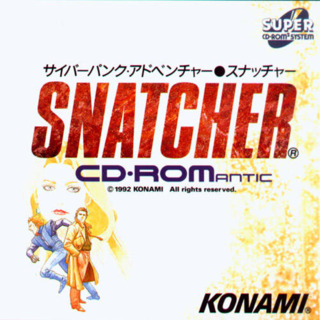Childish Fiction
"Metal Gear" (1987) was Kojima's first video-game, an ode to Hollywood pop references of the 80's, with "Rambo" serving as a major inspiration, but also borrowing elements from "Escape from New York" or "Terminator". "Snatcher" was its followup, but then, Kojima chose to pay an hômage to one of the greatest movies of all times – "Blade Runner". It's impossible not to think too much about it, as every element in "Snatcher" seems to derive at some level, from Ridley Scott's masterpiece: from the dark cyber-punk depiction of the future, to the ever-looming menace of a race of killer cyborgs (though in "Snatcher" they resemble more closely Cameron's "Terminators" than the actual replicants), down to main characters' personalities and visual characterization.
As an unofficial interactive translation to "Blade Runner", "Snatcher" is a success. The player embarks on a noir mystery, searching for clues regarding the main character's past, while simultaneously hunting down killer robots that mask themselves as humans. Despite the game being incredibly linear, there seems to have been a great effort in making players feel like a true Private Investigator, by making them solve clever criminal puzzles, through the discovery of each of piece evidence and its consequent interpretation. And though, in essence, the game plays like a simple text adventure game, it makes excellent use of its sparse aesthetic elements, using simple animations as a form of emulating film, and upping the tempo with well placed sound effects and music, which can heighten the sense of discovery of a particular clue or anticipate a nearby plot-twist. There are also a few shooting sequences to punctuate the investigation; these add a much needed surprise factor to whenever a cyborg is found, further enhancing tension while the player is investigating clues.
It is obvious that "Snatcher" goes as far as the medium could go at the time it was designed. Kojima creates his own devious world filled with his trademark post modern humor, and all these little references to Hollywood cinematography, but he never ceases to impregnate it with a consistency and level of detail that simply doesn't exist in most games today, let alone those from twenty years ago. He also does a thorough background search on the scientific, social and political themes that he then molds and solidifies into an arresting thriller, filled with intrigue and drama. Like all of Kojima's games, "Snatcher" elevates the writing quality of the means, in a search for the narrative depth that we grew accustomed to in cinema.
And yet, one can only get a bitter taste when Kojima so often invites a comparison between his video-games and the 7th art; a comparison to which all his games fall on the short end of. "Snatcher's" aesthetic, while clearly inspired by the noir-ish ambiance of the movie, features warm color palettes [more prevalent in the later versions than in the less detailed, yet more consistent, MSX original] and an upbeat electro-jazz soundtrack, which clash severely with the gloomy dystopian mood. Kojima's writing, though light-years ahead of his peers, is polluted with Anime tropes and immature sexual jokes that can only be seen as childish, especially when compared to the somber nature of "Blade Runner's" drama. Not to mention that the most important story layer of "Blade Runner" – Philip K. Dick's own existential dilemmas – is completely absent from the video-game; in exchange, we get a story about an egomaniacal soviet scientist who wants to take over the world. In film, we get a powerful existentialist science fiction drama, but in the video-game version, we get a Saturday morning Japanese cartoon… sadly, it's the story of our means.

